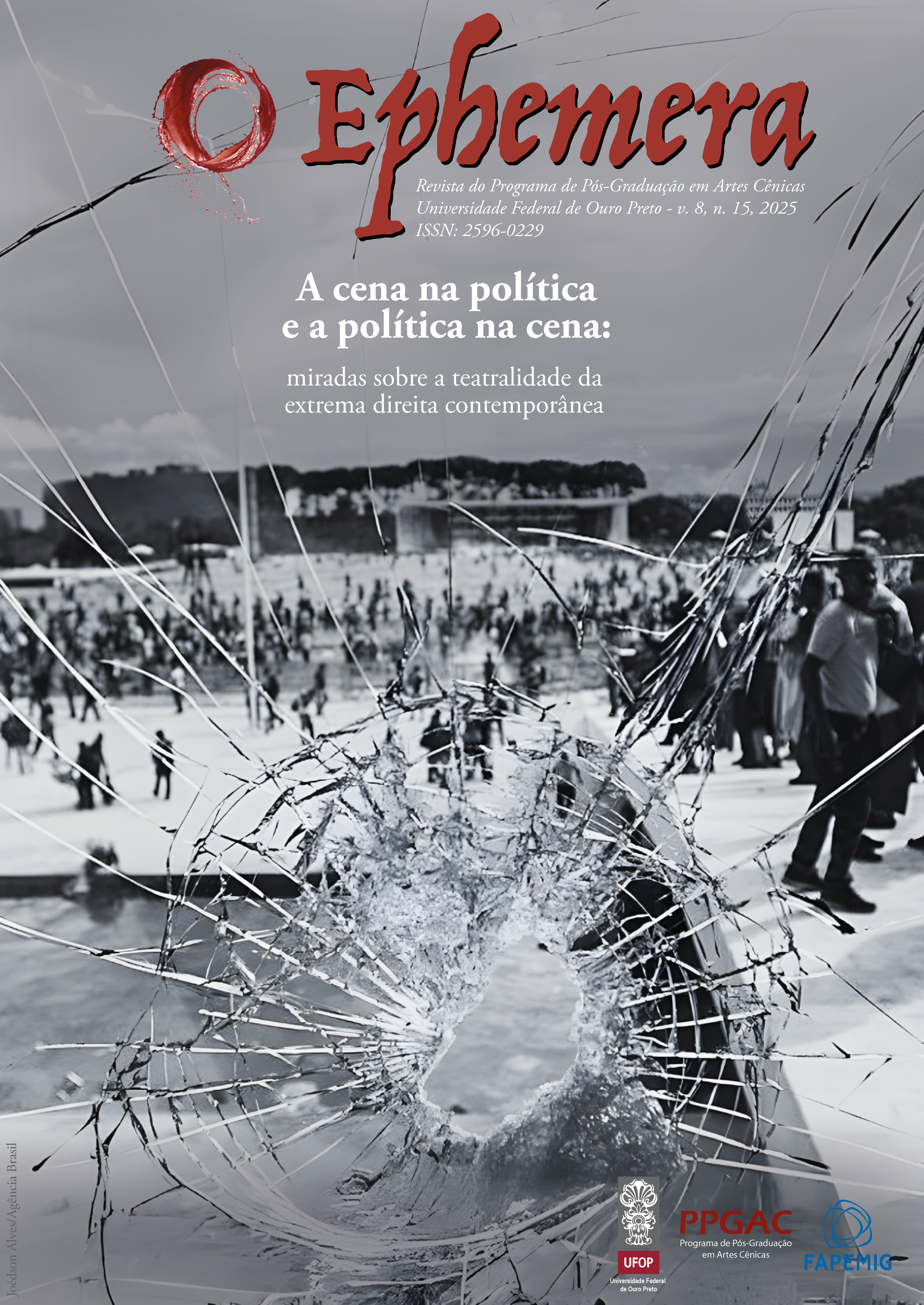From giro to gira
Embodied poetics and pedagogies
Abstract
Creating relational and engaged, embodied poetics and pedagogies in the field of theater
became a (self)provocation of the author, faced with the conjunctural demands of a fractured world
in the period that encompasses the pandemic that affected the world since 2020 to the times in search
of overcoming its effects. It is recognized as an urgency, in the most diverse educational and creative
contexts, to think and invent collective strategies, at the level of action, that consider the transformations
in ways of living, the ways in which relationships have been constructed and the demand for subversion
of dominant, hegemonic ways of thinking and creating, of producing knowledge. Thus, this study
composes a cartography that, in an autoethnographic approach, maps out some principles and procedures
that cross the author’s path in order to investigate and create poetics and theatrical pedagogies crossed
by dissident arrangements, des and decolonial (Walsh, 2017) compositions and creative and pedagogical
processes. Approaches present in concepts such as “corazonar” (Santos, 2021), “giro” and “gira” (Rufino,
2021), to think about other epistemologies, and the thinking around an “engaged pedagogy” (hooks,
2017) are articulated in the author’s proposal, as an artist-teacher-researcher, in favor of relational and
contextualized experiences, given the emergence of other practices and other modes of coexistence and
creation, in art and in life.
Downloads
References
AGAMBEM, Giorgio. O que é o contemporâneo e outros ensaios. Chapecó: Argos, 2009.
BHABHA, Homi. O terceiro espaço. Entrevista conduzida por Jonathan Rutherford. Revista do Patrimônio Histórico e Artístico Nacional, n. 24, IPHAN, 1996, p. 35-41.
BOURRIAUD, Nicolas. Estética relacional. São Paulo: Martins Fontes, 2009.
FABIÃO, Eleonora. Performance, Teatro e Ensino: Poéticas e Políticas da Interdisciplinaridade. In: FLORETINO, A.; TELLES, N. (org.). Cartografia do ensino de Teatro. Uberlândia: EDUFU, 2009, p. 61-72.
FABIÃO, Eleonora. Programa performativo: o corpo-em-experiência. Revista do LUME, n. 4, p. 1-11, dez. 2013. Disponível em: https://orion.nics.unicamp.br/index.php/lume/article/view/276. Acesso em: 13 maio 2024.
hooks, bell. Ensinando a transgredir: educação como prática da liberdade. 2. ed. São Paulo: Martins Fontes, 2017.
MARTINS, Leda Maria. Afrografias da Memória: o reinado do rosário do jatobá. São Paulo: Perspectiva, 1997.
NARDIM, Thaise. As Atividades de Allan Kaprow: artes de agir, obras de viver. Revista-Valise, Porto Alegre, v. 1, n. 1, ano 1, p. 105-117, jul. 2011. Disponível em: https://seer.ufrgs.br/RevistaValise/article/download/19892/12804.%20Acedido%20em%2018.08.2016/0. Acesso em: 30 jan. 2025.
OYĚWÙMÍ, Oyèrónkẹ́. A invenção das mulheres: construindo um sentido africano para os discursos ocidentais de gênero. Rio de Janeiro: Bazar do Tempo, 2021.
RUFINO, Luiz. Vence-demanda: educação e descolonização. Rio de Janeiro: Mórula, 2021.
SANTOS, Boaventura de Souza. O fim do império cognitivo: a afirmação das epistemologias do Sul. Belo Horizonte: Autêntica, 2021.
VIANNA, Klaus. A dança. São Paulo: Summus, 2005.
WALSH, Catherine (ed.). Pedagogías decoloniales: prácticas insurgentes de resistir, (re)existir y (re)vivir. v. 1. Quito-Equador: Abya Yala, 2017.
Copyright (c) 2025 Vinícius da Silva Lírio

This work is licensed under a Creative Commons Attribution-NonCommercial 4.0 International License.
O/As autore/as mantêm os direitos autorais sobre os documentos publicados pelo periódico e cedem ao periódico o direito de publicação dos textos e de seus metadados (em múltiplos suportes e formatos), inclusão em bases de dados e assinatura de acordos de indexação atuais e futuros (mesmo com licenças menos restritivas, para os textos, ou sem restrições, para os metadados), de modo a garantir a indexação do documento publicado e de seus metadados.
O documento publicado será distribuído nos termos da Licença Creative Commons Atribuição - Não-Comercial 4.0 Internacional (CC-BY-NC) que permite o uso, a distribuição e reprodução em qualquer meio desde que sem fins comerciais e que o artigo, os autores e o periódico sejam devidamente citados.



